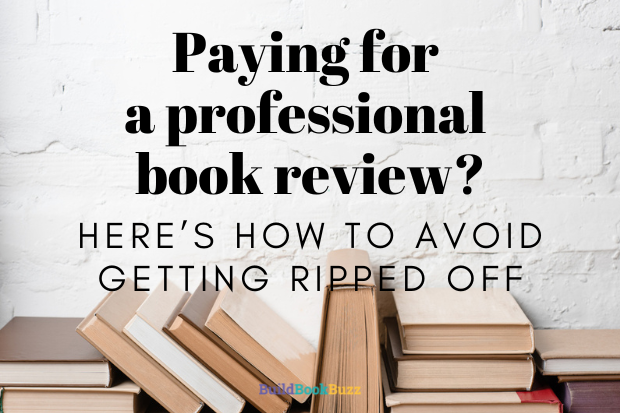 While Amazon doesn't let you pay for reader reviews, you are allowed to pay for and share a professional book review. To help you avoid getting ripped off, I asked my friends at BlueInk Review for advice on how to identify a legit review service. BlueInk Review offers objective reviews of independently and traditionally published books. Its reviewers are writers largely drawn from major mainstream publications such as The Wall Street Journal and The Washington Post, and notable blogs, as well as editors from respected publishing houses. Select reviews appear in Booklist magazine, a highly respected review publication that reaches 60,000 librarians. Our guest blogger is Patti Thorn, a managing partner at BlueInk.
While Amazon doesn't let you pay for reader reviews, you are allowed to pay for and share a professional book review. To help you avoid getting ripped off, I asked my friends at BlueInk Review for advice on how to identify a legit review service. BlueInk Review offers objective reviews of independently and traditionally published books. Its reviewers are writers largely drawn from major mainstream publications such as The Wall Street Journal and The Washington Post, and notable blogs, as well as editors from respected publishing houses. Select reviews appear in Booklist magazine, a highly respected review publication that reaches 60,000 librarians. Our guest blogger is Patti Thorn, a managing partner at BlueInk.
Paying for a professional book review? Here’s how to avoid getting ripped off
By Patti Thorn
You’ve written your book and now – deep breath! – it’s time to get it reviewed. This can seem a daunting process: Who do you trust with a book you’ve been working on for months and even years?]]>
While Amazon doesn’t let you pay for reader reviews, you are allowed to pay for and share a professional book review. To help you avoid getting ripped off, I asked my friends at BlueInk Review for advice on how to identify a legit review service. BlueInk Review offers objective reviews of independently and traditionally published books. Its reviewers are writers largely drawn from major mainstream publications such as The Wall Street Journal and The Washington Post, and notable blogs, as well as editors from respected publishing houses. Select reviews appear in Booklist magazine, a highly respected review publication that reaches 60,000 librarians. Our guest blogger is Patti Thorn, a managing partner at BlueInk.
Paying for a professional book review? Here’s how to avoid getting ripped off
By Patti Thorn
You’ve written your book and now – deep breath! – it’s time to get it reviewed. This can seem a daunting process: Who do you trust with a book you’ve been working on for months and even years?
Fortunately, there are many legitimate review sources who can provide carefully considered, professional reviews, including review companies that charge a fee and guarantee a review for most types of books. This makes it as easy as sliding your book in a mailing envelope or uploading your PDF.
But, as in every field, there are also scammers willing to take your money and provide a substandard product that will do you little good in convincing readers to buy your book, let alone persuading bookstore owners and librarians to stock it.
Legitimate review source…or not?
7 questions to ask
So, how can you tell the difference between legitimate paid review sources and fakes?
Ask yourself these seven questions.
1. Is the review source respected and well-known in the publishing world?
Sure, you can get a review from Joe Blogger who has a following of five people, but if readers don’t know the name, they aren’t likely to put much trust the review. Spending your money with a company or blogger that has name recognition and a proven track record is a better investment.
2. Does the professional book review company tell you who their reviewers are and what qualifications they have?
Some companies recruit the neighbor next door, the friend at a book club, the sometime-blogger who wants a little extra cash.
But reviewing is a difficult job that requires real expertise.
The neighbor may love to read, but does she have enough background in a specific genre to know when the author has met the requirements of the genre or cleverly broken the mold? Can she articulate what is right and what is wrong with a book in a way that readers and the author will clearly understand? Can she be objective with a book that she might not normally read, seeing its value for others?
Professional book reviewing is a difficult job that requires real expertise.Click to tweetThis is not a hobby. It’s a profession.
Be sure that the reviewers can live up to these standards. Look for reviewers that have written for mainstream publications or reputable websites, edited for publishing houses, published books of their own, or have expertise in a specific subject matter.
3. Is the company offering customer reviews that they promise to post on Amazon?
Everyone is looking to get reviews on Amazon. But buying customer reviews is against the site’s policy and a sure way to ruin your reputation and get you and your books kicked off that important retail site.
4. Are the reviews accepted by Amazon and Barnes & Noble in their editorial review slots (vs. the consumer review section)?
Professional reviews are eligible for placement in the editorial review sections on Amazon and Barnes & Noble’s site. This indicates a higher level of trustworthiness than reviews that run in the customer section.
5. How much does the company charge for a professional book review?
Of course, it’s great to get a review for $50, but that’s barely enough to keep a company running, let alone pay reviewers a fair sum. While no one is going to get rich writing reviews, legit companies pay reviewers and themselves, which will be reflected in the cost of the review.
6. Who are the people behind the company?
Do they have experience in the publishing world? Running a professional review service requires background knowledge of the industry and experience in matching books to the right reviewers.
You also want a service that can edit reviews for fairness and balance.
7. What is the quality of the reviews the company has provided in the past?
Are they well-written: articulate, concise, well-organized, and clear? Do they offer coherent, easy-to-follow summaries of the book? Do they support their criticisms with examples from the book?
Check the website for previously written reviews.
Beware of reviews where the critic makes broad statements that seem highly personal, rather than well-considered. For example: “I didn’t like the characters,” is a far different from “The characters seem stereotypical and flat, displaying either all-positive characteristics or all negative.”
“Beware of reviews where the critic makes broad statements that seem highly personal, rather than well-considered.”
Additionally, if all the reviews are positive, this isn’t a review company, it’s a flattery factory.
Legit companies offer as many reviews that are mixed and negative as they do positive ones. That’s because it’s hard to write a great book – and most books falter in one area or another.
What’s on their website?
Click around the professional book review company’s website with these questions in mind:
- Are reviewers and their qualifications listed?
- Can you see other reviews?
- Is the price clearly designated?
- Does the site display detailed testimonials?
- Does the site explain where the reviews will be seen?
Remember, when it comes to your book, not only are you looking for a review that will help you market your book, you are also looking for constructive feedback that you can trust.
When it comes to your book, not only are you looking for a professional review that will help you market your book, you are also looking for constructive feedback that you can trust.Click to tweetWhile everyone dreams of a rave review, one that offers honest constructive criticism can be a godsend in the long run.
For that, you need the real thing.
Have you paid for a professional book review? Tell us about the experience in a comment.
]]>